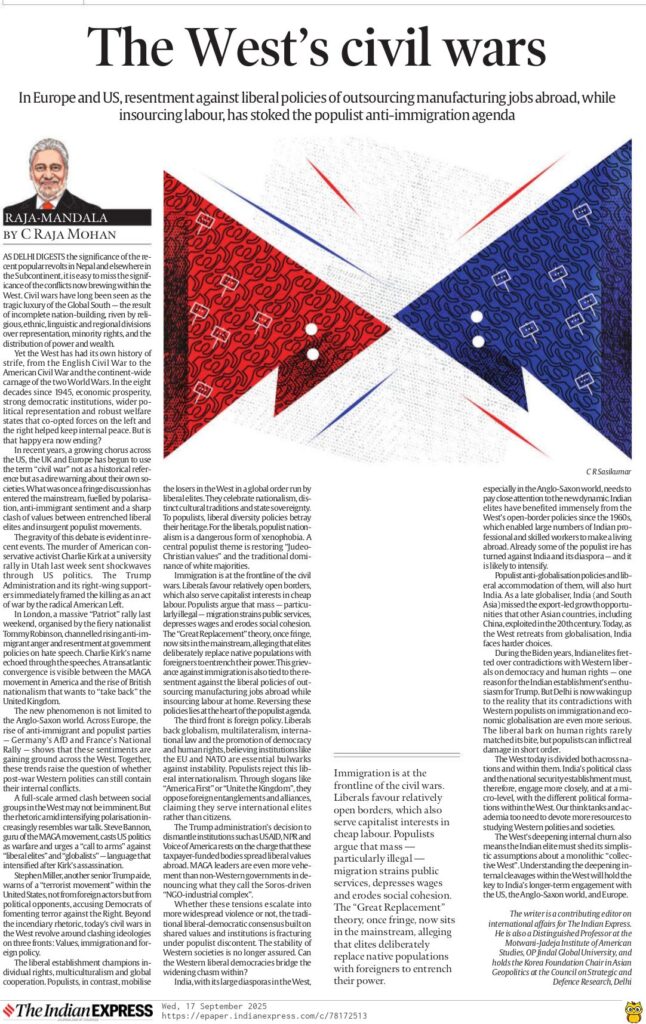
Importance of the editorial for Mains Exam
01
The editorial analyzes various perspectives on the possibility of future civil war in the Western world. (Essential for GS Paper – II & PSIR)
- The term “civil war” What was once a fringe discussion in the US, UK, and Europe has moved into the mainstream, driven by polarization, anti-immigrant sentiment, and a sharp clash of values between entrenched liberal elites and insurgent populist movements.
- The gravity of this debate is clearly evident from recent events. Last week, the murder of American conservative activist Charlie Kirk at a university rally in Utah rocked American politics. The Trump administration and its right-wing supporters immediately dismissed the killing as a plot orchestrated by radical American leftists.
- The gravity of this debate is clearly evident from recent events. Last week, the murder of American conservative activist Charlie Kirk at a university rally in Utah rocked American politics. The Trump administration and its right-wing supporters immediately dismissed the killing as a conspiracy orchestrated by radical American leftists, further demonstrating their commitment to the MAGA movement.
- A transatlantic convergence is emerging between the MAGA movement in the US and the rise of British nationalism that seeks to “take back” the United Kingdom. For example, last weekend in London, a massive “patriot” rally organized by radical nationalist Tommy Robinson highlighted growing anti-immigrant anger and resentment toward government policies on hate speech, and Charlie Kirk’s name resonated throughout these speeches.
- Full-scale armed conflict between social groups in the West may not be imminent. But amid growing polarization, rhetoric is increasingly reminiscent of war talk. Steve Bannon, the guru of the MAGA movement, presents American politics as a war and calls for “taking up arms” against the “liberal elite” and “globalists”—language that intensified after Kirk’s murder.
- This new phenomenon is not limited to the Anglo-Saxon world. Across Europe, the rise of anti-immigrant and populist parties like Germany’s AfD and France’s National Rally shows that these sentiments are gaining ground across the West. Together, these trends raise the question of whether post-war Western politics can still manage its internal conflicts.
02
The editorial offers three perspectives on the clash of ideologies between liberals and populists, which could lead to a future civil war. (Essential for GS Paper – II & IV and also PSIR)
- Beyond inflammatory rhetoric, today’s civil wars in the West revolve around clashes of ideologies on three fronts: values, immigration, and foreign policy.
- Values: The liberal establishment supports individual rights, multiculturalism, and global cooperation. In contrast, populists mobilize the West’s losers in a global system run by liberal elites. They celebrate nationalism, distinct cultural traditions, and state sovereignty. For populists, liberal diversity policies betray their heritage. For liberals, populist nationalism is a dangerous form of xenophobia. A central theme of populism is the restoration of “Judeo-Christian values” and the elimination of the traditional dominance of the white majority.
- Immigration: Immigration is a major cause of civil wars. Liberals favor relatively open borders, which also serve capitalist interests in cheap labor. Populists argue that large-scale—especially illegal—immigration strains public services, lowers wages, and undermines social cohesion.
- Foreign Policy: The third front is foreign policy. Liberals support globalization, multilateralism, international law, and the promotion of democracy and human rights, and believe that institutions like the European Union and NATO are necessary safeguards against instability. Populists reject this liberal internationalism. Through slogans like “America First” or “Unite the Kingdom,” they oppose foreign entanglements and alliances, claiming that they serve international elites rather than citizens.
03
The editorial describes the challenges that Indian immigrants in Western countries will face in the future. (Essential for GS Paper – II and PSIR)
- With its large diaspora in the West, especially the Anglo-Saxon world, India needs to pay close attention to this new dynamic. Since the 1960s, the Indian elite has benefited significantly from Western open border policies, which have allowed large numbers of Indian professionals and skilled workers to earn a living abroad. Some populist resentment has already been directed against India and its diaspora, and this is likely to grow.
- Populist anti-globalization policies and liberal accommodations to them will also harm India. As a late globalizer, India (and South Asia) missed out on the export-led growth opportunities that other Asian countries, including China, exploited in the 20th century. Today, as the West retreats from globalization, India faces even more difficult choices.
04
The editorial gives suggestions to India regarding the current political situation in the Western world. (Essential for GS Paper – II and PSIR)
- India must wake up to the reality that its contradictions with Western populists on issues of immigration and economic globalization are even sharper. Liberals’ sharpness on human rights can hardly match their sharpness, but populists can cause real damage in the short term.
- Since the West today is divided between and within nations, India’s political class and national security establishment must engage more closely and at a micro level with the various political formations within the West, and our think tanks and academics also need to devote more resources to the study of Western politics and societies.
- The West’s deepening internal churn also means that Indian elites must abandon their simplistic notions of a monolithic “collective West.” Understanding the deepening internal divisions within the West will be key to India’s long-term engagement with the US, the Anglo-Saxon world, and Europe.
Author: currentaffairs4upsc
UPSC


